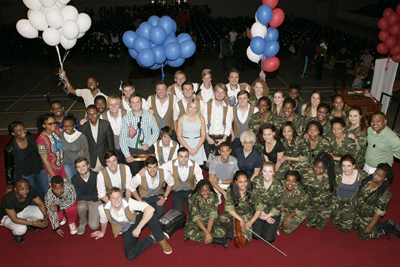UFS congratulates Wayde van Niekerk and other students for their national and international accomplishments

Kovsies showing the world that success is inevitable
Photo: Johan Roux
|
Students from the University of the Free State (UFS) have not only conquered South Africa (SA), they have also left footprints in the world. During 2014 and 2015, our students have performed well in various fields.
A special celebratory event was held at the Bloemfontein Campus on Tuesday 15 September 2015. Members of the Rectorate, Student Representative Council (SRC), Grey College Secondary School personnel and former principal, Mr Johan Volsteedt, as well as UFS staff members and students gathered at the Callie Human Centre to congratulate those students who have recently represented the university with excellence atnational and global levels. Also present were representatives from the Department of Sports Arts Culture and Recreation (SACR) in the Free State and the Free State Sport Confederation (FSSC).
Sports leadership has proven to be one of Kovsies’ areas of expertise. From Wayde van Niekerk making international headlines as the 2015 Men’s 400m World Sprint Champion, to Nicole Walraven who was named as the SA under-21 Hockey 2015 Player of the Year, speaks the language of winners.
Wayde believes that his achievements are also for his family, friends, mentors, and the university community to rejoice in.“What I achieved is our achievement,” he said “the person I am today is because of the people around me.” Also supporting him at this event was MsAns Botha, his coach together with his family and friends.
Andricia Hinckemann’s commitment to promote environmental sustainability in light of the global warming crisis earned her the Miss Earth SA 2015 second princess status.
The UFS Debating Society also joined the ranks as highfliers when announced as South African National Universities Debating Champions for 2015. The UFS team competed in nine preliminary rounds. Devon Watson and NkahisengRalepeli from the UFS had to fight their way through nine preliminary rounds to the finals. Competing in the category English as a First Language, Devon and Nkahiseng brought yet another championship title home.
Success is music to our ears here at Kovsies, Veritas and Marjolein showed us that music can also symbolize success. These residence serenade groups took first and second place, respectively, at the 2015 ATKV National University Sêr competition.
Other students who have the world in their hands and are striving to make it a better place include Rolene Strauss (Miss World 2015), Elzane van der Berg (Deaf Miss South Africa 2014), the Shimlas (2015 Varsity Cup champions),KovsieNetball (2014 Varsity Netball champions and winners of 2014 National Premier League), KovsieTennis (2014 USSA Champions) and Varsity Sevens Champions 2015.
Prof Jonathan Jansen, Vice-Chancellor and Rector of the university remarked upon the inevitable nature of success amongst our university’s students. “Whether they are in athletics, netball, or debating, Kovsie students do well in every aspect of their lives.”